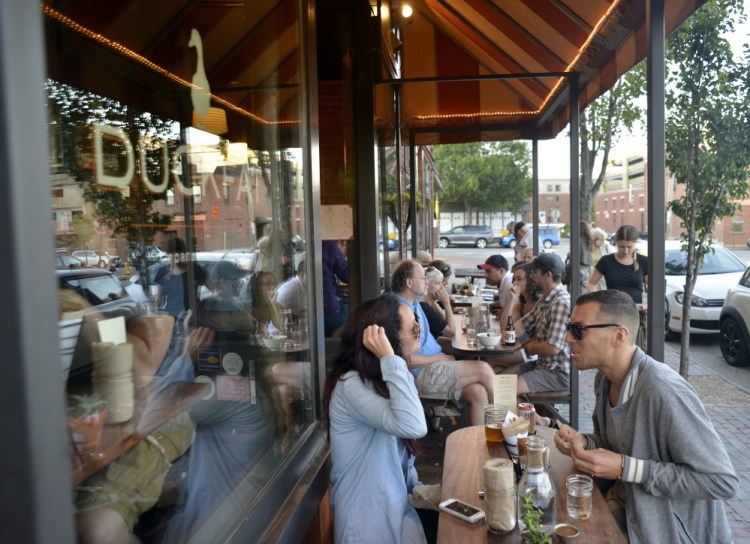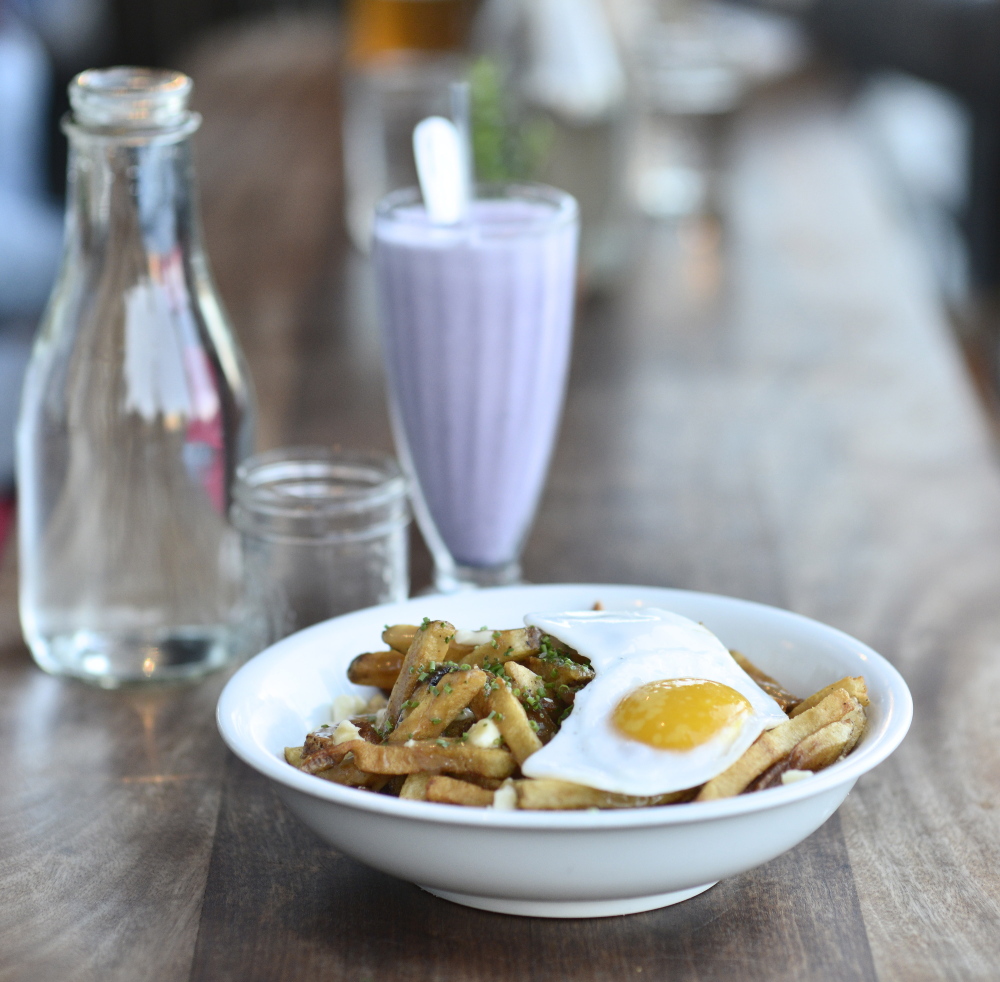Duckfat often comes to mind on a fall or winter evening. The cozy 32-seat space is warmly lighted against the darkening days; a poutine with Belgian fries and a sunny-side-up egg provides the necessary fortitude against the cold; and the black-T-shirted (and often well-bearded) employees are always wry and welcoming – whether you’re with a group of friends, alone at the bar, or simply picking up a cone of Maine potatoes fried in duck fat with a side of house-made mayo to go.
Summer is another matter, especially when you live here and can easily get fresh and local without waiting on Middle Street for a table for 30 to 45 minutes (though it has become a nice block on which to hang out).
My guest Ben Slayton and I, however, are prepared to wait. We’re here to look at the ways in which Rob Evans and Nancy Pugh have been part of the evolution over the past decade of talented chefs transforming lowbrow sandwich shops and burger joints into popular highbrow eateries.
You can imagine our giddiness when we arrive at 5 p.m. (as opposed to the usual 6 to 7 p.m.) to find we’re seated immediately, inside or out, even on a Friday evening in August. (Don’t tell!). We promptly choose one of the two wooden tables and benches affixed to the brick-laid sidewalk and plot our path through the menu.
“It’s a treat to be at the receiving end of the spectrum,” Ben says over a Maine Beer Company draft. He sources Maine pasture-raised and humanely treated beef and pork and distributes to an avid network at monthly Meat Ups. Now, in partnership with Jordan’s Farm, he’s offering this meat at a new market, The Farm Stand on Ocean Street, just across the bridge in South Portland.
Eating with Ben is a treat for me as well – he’s an example of the tremendous effort that local farmers, butchers, food producers, and distributors put into the meals we too often take for granted. He’s also working hard to make sure farmers get a fair price for the animals they raise by encouraging buyers to value meat for its quality.
While Duckfat’s menu may seem short and simple, almost snack or lunch-like, when our waiter brings our food, we find ourselves surrounded by bounty (though this is not the place to go if you want to come away with the feeling of having eaten an extravagant dinner). The poutine ($12), however, can be a meal in itself – and the duck fat-fried Green Thumb Farms potatoes with Silvery Moon Creamery cheese curd and chives are ridiculously addictive.
As if to balance the hearty poutine, the chilled English pea soup ($6) is light and delicate rather than pea-soup thick, topped by an espresso-style swirl of crème fraîche and sprig of pea shoots. The Commonwealth Poultry Farm duck salad ($13) is fresh and tasting of spring with thin prosciutto-esque slices of duck breast over frisée lettuce and a hard-cider vinaigrette, all decorated by a sprinkling of white radish blossoms.
“The mint with the sweet of the tomato chutney and the lamb is a nice surprise,” Ben says of his North Star Sheep Farm lamb panini ($13). “It’s a fresh twist on the flavor of the mint jelly my mom used to serve with lamb when I was a kid.”
“What is it that Rob Evans and Duckfat are doing so well?” I ask.
“I’d say they’re bringing back the traditions of the past, while looking forward and using new techniques,” Ben suggests. “They also keep an eye on efficiency and simplicity, which allows them to serve quality ingredients at a price people can afford. The key is using parts of the animal that often get thrown away, like the duck fat.”
I agree, and would also say that they’ve managed to make cheap fast food like fries, sandwiches, sodas and donuts into something special, again by bringing back the quality and flavor that somehow got lost along the way. It’s every kids dream, the foods that were frowned on as junk food have become not only healthy, but even more delicious, to boot.
We realize we haven’t even started on our sandwich board ($18) yet, with its artful arrangement of house-made pickles, pork belly, duck foie gras terrine, jar of roasted tomatillo salsa, cured ham and buttermilk fried onion rings.
I find the fried onions, pork belly and ham (which Ben recently delivered here), delectable eaten straight up with my fingers, while Ben cuts the Sorella’s Bakehouse brioche rolls in half to fill with various combos of ham and fried onions or duck terrine and pickles. His works of art look like the perfect highbrow sandwich, though still providing lowbrow delight.
The same goes for the mocha milkshake ($6) in an old-fashioned Libbey glass with a straw, and the inimitable citrus-infused, duck fat-fried doughnut holes ($5) with accompanying caramel and spicy chocolate dipping sauce. The cinnamon-sugared nuggets of fried dough stand alone even without dipping, so I find myself sipping the chocolate and caramel straight from the cups – something I caught my father doing last time he was here. (Lowbrow tendencies evidently run in the family.)
As for the big picture, since Duckfat opened in 2005, its success has inspired many young chefs to source locally, as well as start their own simple-food-as-gourmet eateries, including Ben’s venture in South Portland, which provides a new venue for the kinds of ingredients that make Duckfat’s food so good.
For all the above, it would be easy to give Duckfat five stars, but I’m thinking of Evans, and those of us who enjoy his cooking. As Maine’s only chef to have garnered awards as a James Beard Best Chef of the Northeast (2009) and Food & Wine Best New Chef (2004), as well as a five-star review for Hugo’s when he owned it, here’s a star’s incentive to keep innovating and delight us with something new.
I know I’ll be back on a cold and dark winter’s night, and at 5 p.m. next summer, to find out what’s next. I’ll also be thinking of the hard work that Ben and the farmers, butchers and distributors like Farm Fresh Connection have contributed to make this food that not only feeds the body, but the heart and soul.
Melissa Coleman is interim restaurant reviewer for the Maine Sunday Telegram. Coleman writes for national and local publications and can be found at melissacoleman.com. Her memoir, “This Life Is in Your Hands: One Dream, Sixty Acres, and a Family’s Heartbreak,” is about coming of age during the 1970s back-to-the-land movement.
Send questions/comments to the editors.




Success. Please wait for the page to reload. If the page does not reload within 5 seconds, please refresh the page.
Enter your email and password to access comments.
Hi, to comment on stories you must . This profile is in addition to your subscription and website login.
Already have a commenting profile? .
Invalid username/password.
Please check your email to confirm and complete your registration.
Only subscribers are eligible to post comments. Please subscribe or login first for digital access. Here’s why.
Use the form below to reset your password. When you've submitted your account email, we will send an email with a reset code.